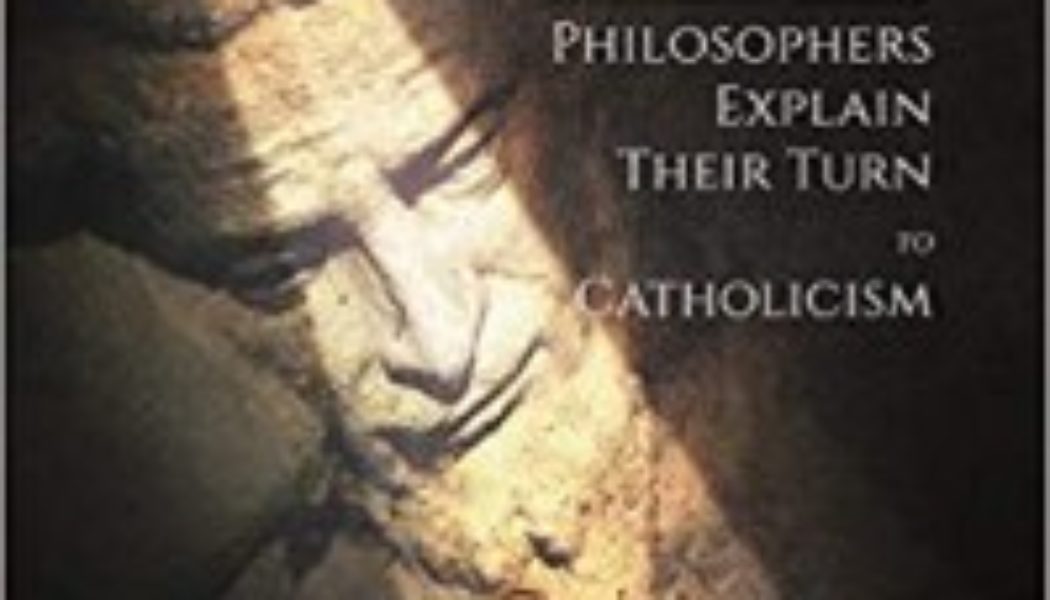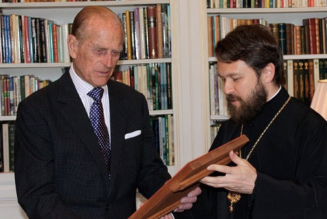 For the past few years, I’ve been co-hosting the FORMED Book Club with Father Fessio and Vivian Dudro of Ignatius Press. Each week, we record a half-hour discussion on whatever book we happen to have selected to read. This past week we commenced the discussion of a new book, which is entitled Faith and Reason: Philosophers Explain Their Turn to Catholicism. The first essay, “The God of a Philosopher” by Edward Feser, was so well-reasoned and, what is more, so well-written, that I feel the compulsion to share it with others.
For the past few years, I’ve been co-hosting the FORMED Book Club with Father Fessio and Vivian Dudro of Ignatius Press. Each week, we record a half-hour discussion on whatever book we happen to have selected to read. This past week we commenced the discussion of a new book, which is entitled Faith and Reason: Philosophers Explain Their Turn to Catholicism. The first essay, “The God of a Philosopher” by Edward Feser, was so well-reasoned and, what is more, so well-written, that I feel the compulsion to share it with others.
“It is sometimes said that teaching something to others is the best way to learn it yourself.” Thus Professor Feser begins. He then explains, at least eventually, how trying to be fair to the classic philosophical arguments for the existence of God in order to teach them well, led to his taking them seriously himself. “Making the explanation as convincing as I could for pedagogical purposes, I inadvertently converted myself.”
Before he gets to this part of his story, however, he explains how he lost his faith and became an atheist.
Raised as a Catholic, he began to lose his faith because of the relativism and modernism of the education he received at a “Catholic” high school where the “spirit of Vatican II” liberalism was the rule:
Standout memories include the priest who spent part of a Scripture class cheerfully explaining various pornographic slang terms, the Mass where ordinary honey wheat bread was used for the hosts, and the theology lecture based on the lyrics to the Rolling Stones’ “Sympathy for the Devil”. Unsurprisingly, several of the clergy would, years later, be exposed as sexual abusers, though I never saw or heard of any of that myself at the time.
Professor Feser than charts his intellectual journey from being a poorly catechized Catholic to being a dyed-in-the-wool atheist. It began with a fascination for the philosophy of Kierkegaard which led to a fascination for Nietzsche: “Christian existentialism was thus the gateway drug that would lead me to atheism, and German philosopher Friedrich Nietzsche replaced Kierkegaard as my existentialist hero.”
An epigram from Nietzsche’s notebooks became something of a personal motto: A very popular error: having the courage of one’s convictions; rather, it is a matter of having the courage for an attack on one’s convictions!!!
This is Nietzsche at his thought-provoking best. Christians did not need the courage of their own convictions; they needed the courage to challenge their own convictions!
With the smugness of the atheist who has “seen through” the transparently weak arguments for Christian philosophy, Feser became convinced that “as a philosopher, I could not be religious”.
The problem was, however, that Nietzsche’s celebrated epigram is itself a two-edged sword, which cuts both ways: “I would come to do something that few people who thrill to Nietzsche’s epigram ever seem to: I applied it to atheism itself, and to my skeptical assumptions about Catholicism. And what I found is that they could not withstand rational attack.”
Putting Nietzsche’s axiomatic principle into practice, Professor Feser had the courage to question his own Nietzschean and atheistic convictions. In doing so, he came to see the inadequacy of atheistic explanations of the cosmos.
First, he became convinced from a study of ideas developed by philosophers of the mind that “none of the existing attempts to explain the human mind in materialist terms could work”. Second, arguments from logic convinced him that “attempts to explain language and meaning in materialist terms also failed”. Third, he came to realize that “mathematical physics tells us little about the nature of matter beyond its abstract structure”.
Having the courage to question his own atheist convictions, he came to understand that materialism is “as riddled with difficulties, unanswered questions, and dogmatic assumptions as atheists take theism to be”. He then took the next intellectually honest step and revisited theism discovering that it was “much more philosophically sophisticated and worked out than I had supposed”.
 This new open-mindedness led him to change his approach in the classroom. Up until this time, he had essentially held up the arguments for God’s existence to be shallow and not warranting serious consideration. “I would line up the arguments and then shoot them down….” His students “dutifully swallowed” his reasoning, “having been conditioned by the surrounding intellectual culture to believe that religion was not in any case the sort of thing that could be supported through reason”.
This new open-mindedness led him to change his approach in the classroom. Up until this time, he had essentially held up the arguments for God’s existence to be shallow and not warranting serious consideration. “I would line up the arguments and then shoot them down….” His students “dutifully swallowed” his reasoning, “having been conditioned by the surrounding intellectual culture to believe that religion was not in any case the sort of thing that could be supported through reason”.
This sort of unquestioning reasoning was not challenging to either the students or their professor. “It was boring as hell.”
Now, however, having the courage to question his own atheist convictions, he decided to bring this courage to the classroom. “My view was that the most interesting way to teach a philosophy class, especially for novices in the subject, was to present a philosophical dispute as something like an intellectual street fight.” The next time he taught the arguments for God’s existence, theism would come out fighting!
He realized that theism could only put up a good fight if he understood theism well enough to defend it. Again, with the courage to question his own convictions, he revisited theistic arguments:
You cannot be confident that you have given an idea a fair hearing until you make a serious effort to understand how a rational person could find it plausible. This is especially important when considering ideas you find alien or unattractive…. It could turn out that it is only unexamined prejudices of your own that have kept you from taking the idea seriously. Certainly you will understand the ideas better as a result of having made the effort.
Instead of making the standard stock objections of the atheist to the arguments for God’s existence, Professor Feser asked instead how Thomas Aquinas or Gottfried Leibniz would respond to the standard atheist objections to theism. He set to work delving and diving deeper into theistic philosophy. He discovered that Aquinas’ Five Ways of showing the existence of God “were saying nothing like what I and most other contemporary philosophers supposed they were”. Professor Feser’s eyes were opened. He had been blinded by prejudice and presumption but now he could see clearly: “[N]o one who has actually studied Aquinas’ natural theology could think that he believes the things commonly attributed to him or that the standard objections have any force at all.”
This revelation was life-changing. It enabled him to improve his teaching and it enabled him to see the philosophical academy from a new and liberating perspective: “[I]t hammered home the lesson that academic philosophers, even when speaking on philosophical topics, often don’t know what they are talking about. They are as prone to prejudice, ignorance, and circular reasoning as anyone else.” It dawned on him that “atheism no less than theism could be motivated by wishful thinking, special pleading, and otherwise irrational habits of mind”.
Determined to avoid these unphilosophical pitfalls, Professor Feser was prompted to explore theism more closely. He began to ask some fundamental questions which highlighted the self-contradictory absurdity of philosophical materialism. “How could it be rational to deny the existence of rational thought processes themselves? How could it be rational to deny the very intelligibility of the world?” The asking of such questions led to inescapable conclusions. A consistent atheist needed to be ultimately committed to fundamentally irrational beliefs which were ultimately insane.
From this moment onwards, Professor Feser’s courageous and rationally consistent pursuit of the truth led him back to the Catholic faith form which he had lapsed many years earlier:
Ten years before I had judged: I am a philosopher, therefore I cannot believe in God. Now, as committed as ever to the rational and objective pursuit of truth but better informed, I drew a different conclusion: I am a philosopher, therefore I cannot be an atheist….
Rational explanation, pursued consistently, led to the conclusion that there is a single, infinite, eternal, necessary, immutable, immaterial, omnipotent, omniscient, perfectly good ultimate cause of things – one that, as I learned from Aquinas’ arguments in particular, is sustaining everything in existence, including me, right now and at every moment.
The Imaginative Conservative applies the principle of appreciation to the discussion of culture and politics as we approach dialogue with magnanimity rather than with mere civility. Will you help us remain a refreshing oasis in the increasingly contentious arena of modern discourse? Please consider donating now.
The featured image is courtesy of Pixabay.
Join Our Telegram Group : Salvation & Prosperity











